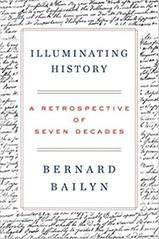 Bernard Bailyn, the historian and Harvard professor who won two Pulitzers, a Bancroft Prize and a National Book Award, died last Friday at age 97. In his teaching and in his more than 20 books, he "reshaped the study of early American history with seminal works on merchants and migrants, politics and government, and recast the study of the origins of the American Revolution," the New York Times wrote. His best known work was The Ideological Origins of the American Revolution, published in 1967, which "challenged the then-dominant view of Progressive Era historians like Charles Beard, who saw the founders' revolutionary rhetoric as a mask for economic interests. It was a fundamental distrust of government power, in Professor Bailyn's view, that led them to throw off the colonial yoke." The book led generations of historians to consider ideological interpretations in early U.S. history.
Bernard Bailyn, the historian and Harvard professor who won two Pulitzers, a Bancroft Prize and a National Book Award, died last Friday at age 97. In his teaching and in his more than 20 books, he "reshaped the study of early American history with seminal works on merchants and migrants, politics and government, and recast the study of the origins of the American Revolution," the New York Times wrote. His best known work was The Ideological Origins of the American Revolution, published in 1967, which "challenged the then-dominant view of Progressive Era historians like Charles Beard, who saw the founders' revolutionary rhetoric as a mask for economic interests. It was a fundamental distrust of government power, in Professor Bailyn's view, that led them to throw off the colonial yoke." The book led generations of historians to consider ideological interpretations in early U.S. history.
His other works include The Ordeal of Thomas Hutchinson (1975), a biography of the last colonial governor of Massachusetts; Voyagers to the West (1987), about the nearly 10,000 British immigrants to North America in the 1770s; and The Barbarous Years (2013), about the period between the founding of Jamestown and King Philip's War. In April, Norton published Bailyn's intellectual memoir Illuminating History: A Retrospective of Seven Decades ($28.95, 9781324005834).

